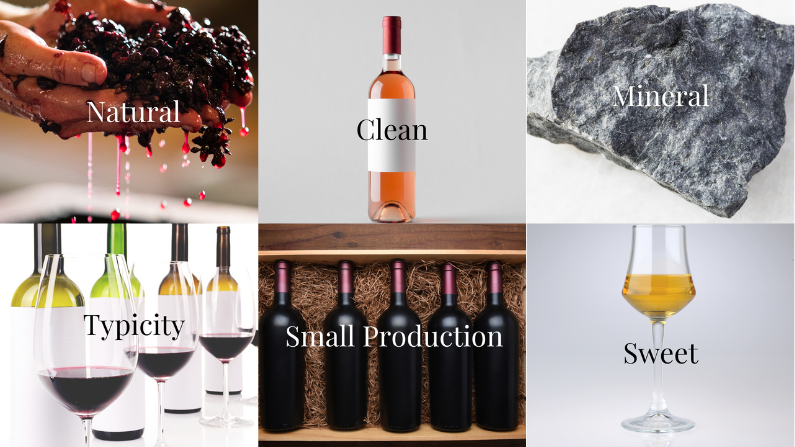
6 of the most questionable words in wine
Disagreeable. Dubious… I toyed with the right word to use here. I read these words in headlines for wine articles week after week after week after week …so I thought I’d share them and get your take!
I have to say, I use all of these, and fairly often (outside of clean – hate that one).
I can’t find a better word outside of minerality to allude to freshness and I still use “natural” but often in finger quotes.
How do feel about these?
Do you use them?
Are you sick of hearing them?

1. Natural
A category for wines with little to no intervention or additives.
Of course “Natural” has no regulated definition, which makes plenty of wine professionals want to put the term ‘to bed’. Some wines in this category are so ‘unplayed with’ that they taste strikingly similar to kombucha – which excites some while making others queasy!
Wines can be made “low intervention”, still termed ‘natural’ and taste like normal delicious wine, however.
Whether you want to use the word natural is up to you!

2. Clean
Another unregulated term that makes room for plenty of creative marketing!
A lot of brands will use this word because of: No synthetic pesticides and no synthetic additives or chemicals (btw – most wine additives are harmless) and no added sweeteners (btw – most wines have no added sweeteners). Many are vegan. Most are crafted from organic, biodynamic, or sustainably-farmed grapes (again – most wines fit this category anyway!).
So, if you do your research, the wine you are drinking is probably pretty close to “clean” – no need to look for this word on the label.

3. Mineral
A word to describe the presence of “freshness” in a wine! Tasters often compare this to rocks, although science hasn’t proven that the rocks in the soil affect the flavor of the grapes! Some will say they can taste the limestone, or chalk, …or granite! Can also be viewed as an association with aroma. “Smells like wet river rocks!”
Do we actually taste these or do we think we do because we so often taste wines grown on these soils and associate a particular aroma and taste with them? We will continue to argue this!

4. Typicity
When a wine tastes the way the majority of wine tasters believe the grapes used to make that wine should taste! Basically a “benchmark” for a variety OR How a variety reflects itself in the glass.
It’s created by historical benchmarks and usually takes into consideration soil and climate, but also a perception of how drinkers think it ought to taste – so obviously a bit subjective and controversial.
“Does this Sauvignon Blanc, taste like Sauvignon Blanc is supposed to taste”?
Blind Tasting is a great way to understand typicity!

5. Small Production
Everyone likes to use this one, again because of marketing… it sounds good …and exclusive. Small production is viewed as higher quality, and it can be, in that a lot of these get more attention from winemakers who are passionate about their mission …but again – not always true!
And what the heck size does it mean?
Small production in actuality is generally around 5,000-50,000 cases or less and limited distribution. So if you hear this term and are uncertain, ask for real numbers.

6. Sweet
A descriptor that used to be widely popular, but now everyone will tell you they don’t drink!
Sweet wines have fallen out of favor because it seems ‘uncool’ to enjoy them now. It’s also assumed that wines are of lesser quality if they are sweet, which can be true, however, there are plenty of exceptions. There are also wines that taste dry but actually have a bit of residual sugar in them – this really helps to create good structure and tame acidity!


A Certified Sommelier and Certified Specialist of Wine with a passion for everything wine + beverage!
